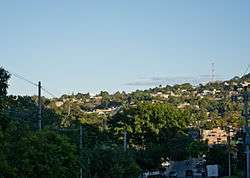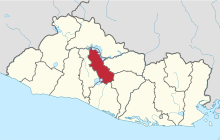Cuscatlán Department
For pre-Columbian polity, see Cuzcatlan.
| Cuscatlán | |
|---|---|
| Department | |
 | |
 Location within El Salvador | |
| Coordinates: 13°50′17″N 89°01′52″W / 13.838°N 89.031°WCoordinates: 13°50′17″N 89°01′52″W / 13.838°N 89.031°W | |
| Country |
|
| Created (given current status) | 1835 |
| Seat | Cojutepeque |
| Area | |
| • Total | 756.19 km2 (291.97 sq mi) |
| Area rank | Ranked 14th |
| Population | |
| • Total | 252,528 |
| • Rank | Ranked 12th |
| • Density | 330/km2 (860/sq mi) |
| Time zone | CST (UTC−6) |
| ISO 3166 code | SV-CU |
Cuscatlán is a department of El Salvador, located in the center of the country. With a surface area of 756.19 square kilometres (291.97 sq mi), it is El Salvador's smallest department. It is inhabited by over 252,000 people. Cuscatlán or Cuzcatlán was the name the original inhabitants of the Western part of the country gave to most of the territory that is now El Salvador. In their language it means "land of precious jewels". It was created on 22 May 1835. Suchitoto was the first capital of the department but on 12 November 1861, Cojutepeque was made the capital. It is known in producing fruits, tobacco, sugar cane, and coffee among other items. The department is famous for its chorizos from the city of Cojutepeque.
Municipalities
- Candelaria
- Cojutepeque
- El Carmen
- El Rosario
- Monte San Juan
- Oratorio de Concepción
- San Bartolomé Perulapía
- San Cristóbal
- San José Guayabal
- San Pedro Perulapán
- San Rafael Cedros
- San Ramón
- Santa Cruz Analquito
- Santa Cruz Michapa
- Suchitoto
- Tenancingo
References
This article is issued from Wikipedia - version of the 2/28/2016. The text is available under the Creative Commons Attribution/Share Alike but additional terms may apply for the media files.